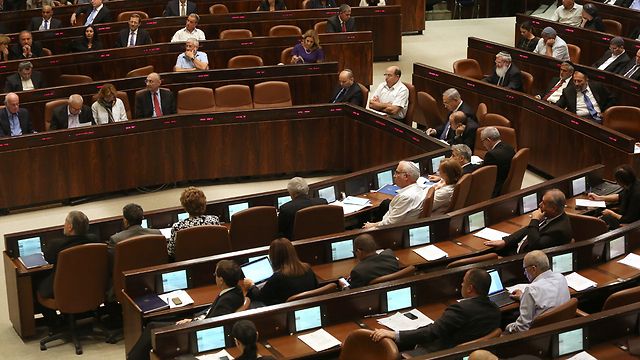
All the things that won't happen because of 2015 elections
From the budget to nutrition campaigns, housing to hospitals, the apparently imminent election has shunted many pressing plans and programs into the back seat.
The final blow-up between Prime Minister Benjamin Netanyahu and Finance Minister Yair Lapid – the gong to signal the final demise of the current coalition and the almost-official opening of the 2015 election campaign – is sending not only the politicians home, but also all the things that were slated for implementation in the framework of the 2015 budget and the Economic Arrangements Law and will now have to be put on hold for a very long time. These may be elections over nothing, but their impact on our lives is very real.
1. No budget before July
The 2015 budget was supposed to be approved by the Knesset by the end of December this year. In practice, however, the budget will not be approved, and 2015 will begin functioning with a continuation budget. This means that instead of receiving an increase for the coming year, the government ministries will be forced to make do with a monthly dose derived from the sums of their budgets in 2014. In other words, instead of growing, the ministries' budgets will shrink.
If elections are held somewhere around March, and assuming it will take at least two months to form the next government (it took three months to put the current coalition together), and then another three months at least to present the budget for cabinet and then Knesset approval, there is little chance that the budget for 2015 will be approved finally before July or August. In other words, the government ministries will have to function for the most part of next year without an approved budget, on the basis of monthly rations.
This means an almost complete suspension of all the special plans, all the additional projects, everything that isn't civil servant wages and ongoing payments to government suppliers that have already signed tenders. In short, public services will be affected, and particularly in areas in which they are needed the most – and all this with the economy experiencing a slowdown, and on the brink of a recession.
There'll be no money, for example, for the EfshariBari national program that is aimed at improving Israelis' nutrition habits; there may not be money for educational programs for alienated and at-risk youth; there may not be money to fund summer schools next year; there may not be money to facilitate shortening the waiting time for appointments at government hospitals; there may not be enough money for grants from the Chief Scientist's Office.
And because the budget will be approved towards the end of next year, only the Defense Ministry will be able to utilize the full sum it will have at its disposal. The other government ministries aren't able to use all the money within a few months, and the state will therefore end up with huge budget surpluses next year. In other words, the taxpaying public will be paying a portion of its taxes in vain.
2. Redundant Economic Arrangements Law
All the reforms and measures included in the current Economic Arrangements Law will have to wait a very long time before being approved in the Knesset towards the end of next year. These are the most important ones:
Regulation of the relationship between the state and the JNF
The Finance Ministry wanted to compel the Jewish National Fund by law to transfer a sum of several hundred million shekels, and up to NIS 1 billion, to the state every year for projects in housing and infrastructure. This clause is at the heart of a fierce political dispute between the finance minister and the politicians on the right, who are defending the JNF and are not willing to force it to meet the standards of public transparency, but prefer instead for the money to continue to flow to various projects at the discretion primarily of the JNF itself.
Restrictions on the private health system
The Economic Arrangements Law was to impose restrictions on the private hospitals, and Assuta in particular, such that if their activities were to increase beyond a certain ceiling, they'd be required to pay the state a heavy tax of up to 67 percent on every additional shekel. The idea was to put the brakes on Assuta's growth rate and divert some of the surgeries back to the government hospitals.
At the same time, the Health Ministry planned to provide the state hospitals with an additional NIS 350 million over each of the coming years to fund the costs of the surgeries that would be added to the public health system. Now, none of these measures can be implemented before 2016, unless the treasury finds a particularly creative way to fund them.
Taxation on medical tourism
In addition, the finance and health ministries wanted to see a 15-percent tax plus VAT on all medical tourism activity – a move designed to cause hospitals to cut back somewhat on their activities in the field. In addition, many travel agents and operators in the field who, according to the treasury, conduct a large portion of their activities in cash would be required to start paying tax on their income to the state. This, too, will not happen before 2016.
Issuance of shares in government companies
Another plan that will be put on hold is the proposal by the Government Companies Authority to issue small portions of stock in a large number of state-owned firms on the stock market. Such a move is designed to introduce new administrative and organizational standards in the government companies, since companies on the stock exchange are required to file a prospectus and publish financial reports every three months. It's not likely to happen now, and the government companies, or some of them at least, can continue to serve as job incubators for political associates.
Preferential employment at gas stations
In 2015, too, the fuel companies will be able to carry on employing newly discharged soldiers at their filling stations, and at their convenience stores in particular, and continue to subsidize a portion of their profits at the expense of the taxpayer, who pays preferential work grants to army veterans who work in these jobs. The Finance Ministry's plans to put a stop to this will have to wait.
Increasing the powers of the Supervisor of Prices
The new Economics Arrangements Law was to significantly increase the powers of the Office of the Supervisor of Prices so as to facilitate much more aggressive action against companies and manufacturers in various industries, and make it much easier to check which companies are using their monopolistic strength to rake in unfair profits at the expense of the consumers. All of this will have to wait too.
Establishment of a Chief Scientist's Authority
Under the new Economics Arrangements Law, the Chief Scientist's Office, which currently constitutes a unit of the Economy Ministry, was to become a separate and independent authority, one that enjoys professional and budgetary freedom. The goal was to reduce the office's dependence on budgetary and political constraints in favor of increasing its flexibility in terms of making investments in companies and start-ups. This, too, will have to wait.
Taxation of foreign athletes
The chairman of Maccabi Tel Aviv can breathe a sigh of relief; taxation of foreign athletes will also have to wait.
Limiting public sector personnel
The Finance Ministry wanted, in the framework of the Economic Arrangements Law, to implement a number of significant measures to reduce or limit the public sector workforce – for example, to reduce the quota of overtime hours and impose a freeze on new recruitment. We won't see any of them now. What we will see is an automatic wage hike of 1 percent for all state employees that will take effect in January, with or without a budget, with or without a government. The cost to the budget will be NIS 1 billion.
3. Zero VAT and friends
And finally, zero VAT on new apartments: The thing that was supposed to be the finance minister's flagship program and the star feature of his next election campaign made it all the way to the finish line, but failed to cross it – and won't go into effect. Lapid is expected to use the plan in his election campaign in any event, but from the opposite direction – to remind the public that he wanted to offer young couples the opportunity to purchase apartments without having to pay VAT, but that Netanyahu stood in the way of the initiative.
Now, after months of waiting (Lapid announced the plan back in March), a significant number of young couples that have been sitting on the fence and expecting the plan to take effect will have to return to the market.
Meanwhile, house prices have risen, and the young couples who have been waiting will probably step up their pursuits; and this is likely to lead to increased demand and a further spike in the prices. What is clear is that the drop in prices that has been promised in recent years is not around the corner.
On the way, there are several additional government-sponsored bills that are set to be buried under the rubble of the fallen coalition. The Environmental Protection Ministry's bill to impose a tax on the use of plastic shopping bags and provide the public with reusable cloth bags has met its demise.
And the government-sponsored bill to put a ceiling of NIS 3.5 million a year on the salaries of senior executives in the financial system is also stuck far back in the drawers of the Knesset committees, and will wait there until who knows when.











